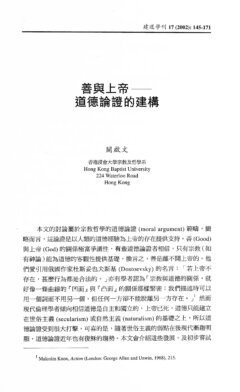善與上帝──道德論證的建構/關啟文
撮要
道德論證認為我們的道德經驗能為上帝的存在提供支持,近年道德論證有復興的趨勢。本文會介紹這些發展,及建構一種作為「最佳說明推論」的道德論證:神本倫理(特別對比起自然主義)最能解釋道德的客觀性。(筆者在前一篇文章已論證,自然主義不大能解釋道德的客觀性。)筆者特別就三方面展現神本倫理的合理性:一、要充分解釋道德律的存在,我們需要一位神聖立法者;二、絕對責任的真實性難以在絕對的上帝以外找到基礎;三、神律倫理能為善的追尋、人性的實現與人生的意義提供最令人滿意的解釋與支持。筆者的結論是:道德論證雖然不是決定性的證明,但它可成為支持上帝存在的累積論證的重要部分。
ABSTRACT
The moral argument purports to show that the evidence from our moral experience supports the existence of God. Recently, the moral argument, in its various forms, has been revived by many philosophers of religion. In this paper, the author introduces these developments, and then tries to formulate the moral argument as an inference to the best explanation, i.e., to argue that theistic ethics is the best explanation of the objectivity of morals, especially in contrast with naturalism. (The author has extensively argued that naturalism cannot convincingly explain the objectivity of morals in a previous paper.) The author tries to show this in three ways. First, the existence of the moral law is best explained as the decree of the Holy Law-Giver. Second, the overriding nature of moral obligation can readily be explained by divine command ethics. Third,theistic ethics can provide good answers to questions about the pursuit of the good and the meaning of life. The author concludes that although the moral argument is by no means a conclusive argument, it is a significant part of a cumulative case for the existence of God.
原載於《建道學刊》17期(2002年1月),頁145-171。







